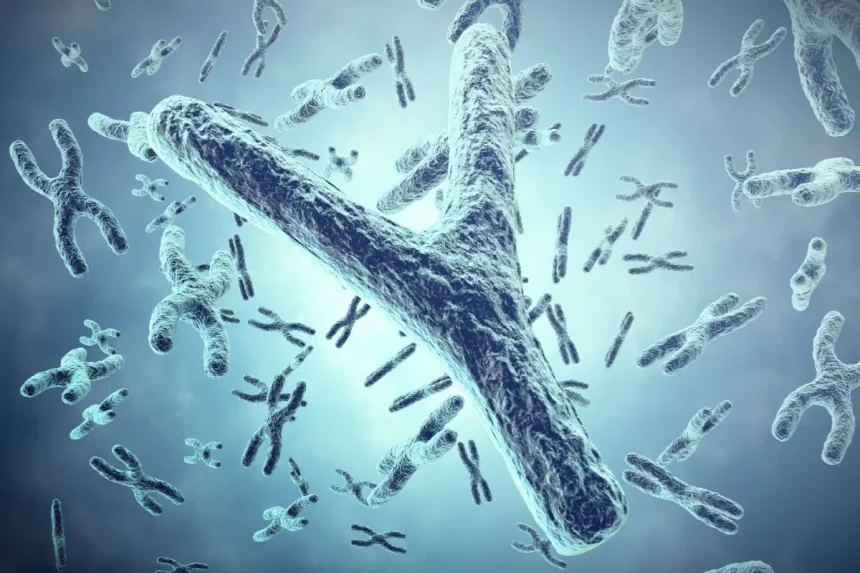Introduction
The Y chromosome, the defining factor of male genetics, is shrinking and losing genetic material over evolutionary time. This phenomenon has sparked concerns about the potential extinction of the Y chromosome, leading to the question: “Are men at risk of extinction?” Although this concept sounds alarming, the scientific reality is complex and involves genetics, evolutionary biology, and potential compensatory mechanisms. In this article, we will explore the decline of the Y chromosome, the reasons behind its shrinking, and whether this trend poses a real threat to the future of men.
Understanding the Y Chromosome
The Y chromosome is one of the two sex chromosomes, alongside the X chromosome, that determines the sex of an individual. It contains the SRY gene, which initiates the development of male characteristics. Unlike other chromosomes, the Y chromosome does not undergo significant recombination (genetic shuffling) with the X chromosome during reproduction, leading to the accumulation of genetic mutations and the loss of non-essential genes over time.
Historically, the Y chromosome was much larger and carried many more genes than it does today. Over the last 200 million years, it has shrunk significantly, losing about 97% of its original genes. Today, it contains only around 55 functioning genes, compared to the 1,000-1,500 genes on the X chromosome. The decline of the Y chromosome is due to its unique nature and the lack of genetic recombination that other chromosomes undergo.
Why is the Y Chromosome Declining?
- Lack of Genetic Recombination: The primary reason for the decline of the Y chromosome is the absence of recombination with its counterpart, the X chromosome. Recombination is a genetic process that helps to repair and maintain the integrity of DNA by swapping genetic material between chromosome pairs. Because the Y chromosome lacks a homologous partner (unlike autosomes that come in pairs), it cannot effectively repair itself, leading to the accumulation of mutations and genetic decay.
- Genetic Drift and Mutations: Over generations, the Y chromosome is susceptible to genetic drift—a random change in the frequency of alleles—and mutations that accumulate without correction. These mutations can result in the loss of genes that are no longer essential for survival, further shrinking the chromosome.
- Selection Pressures: The Y chromosome carries very few genes critical for survival, unlike other chromosomes. This lack of selection pressure allows the chromosome to shed genes over time, focusing primarily on the functions that are crucial for male fertility, such as sperm production.
Potential Extinction of the Y Chromosome: Myth or Reality?
The idea that men might become extinct due to the loss of the Y chromosome is a topic of debate among scientists. Although the chromosome has significantly declined, the extinction of men is unlikely for several reasons:
- Gene Compensation: Some genes originally found on the Y chromosome have been relocated to other chromosomes over evolutionary time. This gene compensation means that the loss of specific Y chromosome genes does not necessarily impact survival or reproduction.
- Sex Chromosome Evolution: The Y chromosome is not the first sex chromosome to experience degeneration. Some species, like certain fish and reptiles, have completely lost the Y chromosome yet continue to reproduce successfully through alternative genetic mechanisms, such as sex determination through environmental factors or autosomal chromosomes.
- Emergence of New Sex-Determining Genes: In some species, new sex-determining genes have evolved to replace the function of the deteriorating Y chromosome. This suggests that even if the Y chromosome were to vanish, other genetic systems could take over the role of sex determination.
- Current Y Chromosome Stability: Recent studies suggest that the Y chromosome has reached a point of stability, with little evidence of ongoing gene loss. The remaining genes are highly conserved and essential for male fertility, indicating that the rate of decline has slowed or stopped altogether.
What Does This Mean for the Future of Men?
The decline of the Y chromosome raises interesting questions about the future of human evolution. However, it is essential to understand that genetics is a dynamic field, and evolutionary pressures could lead to new solutions over millions of years. Scientists are exploring various evolutionary outcomes, including the possibility of new sex chromosomes or alternative reproductive strategies.
While the idea of men going extinct is a fascinating narrative, the reality is that human evolution is a slow and complex process with numerous checks and balances. The Y chromosome’s decline does not necessarily translate into the extinction of men but rather points to the intricate dance of evolution and genetic adaptation.
Conclusion
The decline of the Y chromosome is an ongoing scientific phenomenon that highlights the complexities of genetics and evolution. Although it is true that the Y chromosome has lost much of its genetic material over time, the possibility of men going extinct is highly improbable. Evolution has shown resilience through the emergence of compensatory mechanisms, alternative genetic systems, and new evolutionary pathways. As research continues, our understanding of the Y chromosome and its future will undoubtedly evolve, reminding us that the story of human genetics is far from over.
Get more info: https://www.timelinetale.com/


